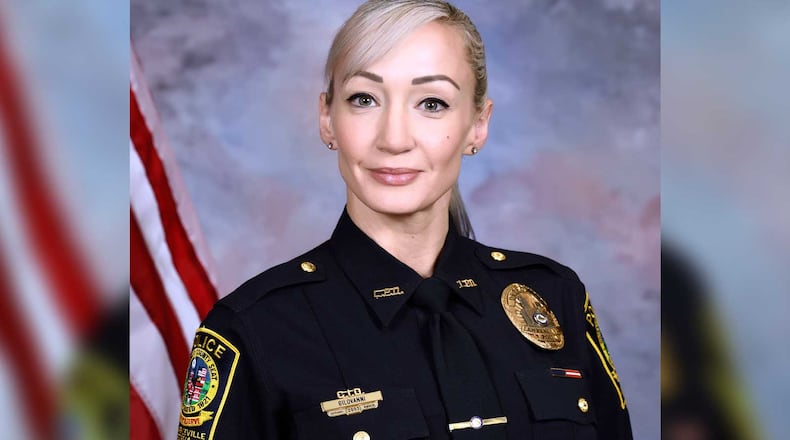The city of Lawrenceville has reached a settlement with the female police captain whose allegations of sexual harassment late last year led to two command staff officers being pushed out of the department.
A settlement agreement obtained by the AJC through the Georgia Open Records Act shows the city agreed to pay Tawnya Gilovanni $300,000. The payment is for a global settlement of her claims, which included a U.S. Equal Employment Opportunity Commission charge and a lawsuit she and her attorney, Ed Buckley, were in the process of filing. With the terms of the settlement, Gilovanni must also withdraw an amendment to her EEOC complaint accusing the acting police chief of retaliating against her.
A joint statement signed by Lawrenceville City Manager Chuck Warbington and Gilovanni also says she voluntarily resigned from her position effective June 23.
“The City thanks Captain Gilovanni for her seventeen years of excellent service and wishes her the best in her future endeavors,” the statement reads.
The settlement brings to a close one chapter out of the sexual harassment saga that revealed a “good ol’ boy” network in the police department, led to additional claims of retaliation and First Amendment violations and raised questions as to how effectively the city handled the internal investigation of the harassment complaint. Still pending is a federal lawsuit filed by the police department’s former chief that was borne out of the harassment investigation.
In October, Gilovanni lodged a complaint with the city claiming that she was being harassed by men on the command staff. An investigation handled for the city by the Elarbee Thompson law firm determined that then-Chief Timothy Wallis and a male captain, Christopher Ryan Morgan, had both sexually harassed the female captain and contributed to a hostile work environment that had permeated the department.
Morgan resigned from his position before he could be interviewed by the investigator. The city announced Wallis would be placed on suspension from his position, but the chief retired shortly after.
While a statement from the city said the decision for Wallis to retire was made mutually, Wallis claimed he was forced to resign or risk being fired for speaking to the media about the case.
An email obtained by the AJC via an open records request showed Warbington had threatened disciplinary action against police and city officials who spoke publicly about the concerns. The wide-reaching directive applied to both Wallis and Gilovanni.
“I will make it clear again,” Warbington wrote in the Jan. 27 email. “No city employee shall discuss this matter directly or indirectly (off the record or on the record) with media. Disciplinary action will be taken if this occurs.”
In the days following Wallis’ lawsuit being filed, the city released a statement holding that Warginton’s directive was misinterpreted.
Despite Warbington’s later walking back the directive — and though Gilovanni is no longer a city employee — she is still not at liberty to speak about the sexual harassment she faced or the settlement agreement. All parties involved are barred from making “any further comment about the settlement or disclosure of any kind to any person or organization,” according to the terms of the agreement which Giolovanni negotiated through her attorney, Ed Buckley.
The settlement says Gilovanni cannot make any comments that are “derogatory in nature” about the city, Warbington or Walker while they are city employees; nor can they make any derogatory comments about her.
Of the $300,000 the city has agreed to pay Gilovanni, $105,000 will be paid to her attorney. Gilovanni will keep the remaining $195,000, which amounts to what she would have been paid in salary in just over two years with Lawrenceville.
Atlanta employment attorney Amanda Farahany said that while Gilovanni’s settlement sum may seem low, considering the evidence in her favor, it might reflect the strength of her claims. What she and her attorney received is the maximum allowed for compensatory damages under Title VII of the federal Civil Rights Act, a cap has been in place since 1991.
“The unfortunate thing is that companies, and counties and governments, are not held accountable fully because of the caps on damages,” said Farahany, who is managing partner of the law firm Barrett & Farahany.
Gilovanni’s case has already led to the passage of House Bill 1390, which codifies the right of a city or county employee who reported workplace harassment to take legal action against their employer if they are faced with retaliation. Farahany said she is helping to draft new legislation that would specifically prohibit sexual harassment in Georgia, giving both government and private employees legal recourse beyond Title VII of the federal Civil Rights Act.
“One of my goals in life is to get rid of the caps on damages on Title VII,” Farahany said. “I think that it is a calculated risk that employers are allowed to make, knowing that the most that they’re ever going to pay is an amount that’s not going to really harm them, and so they can make decisions that are bad for employees, bad for sexual harassment victims.”
Data specialist Jennifer Peebles contributed to this story.
Keep Reading
The Latest
Featured


